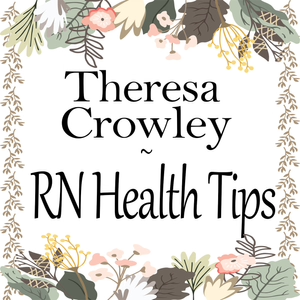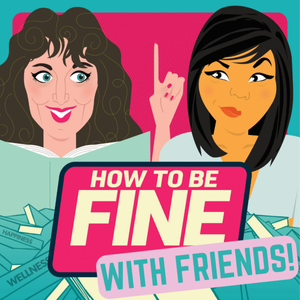
Caregiver Conversation with Kayla Estenson Williams
06/03/21 • 49 min
Deep down there is a little part of you that knows you need therapy.
If you are a caregiver you can find a million reasons why you don't have the time/can't go.
This episode is for everyone who wants to know...
What happens in that first therapy session
How therapy is different than a FB Group or an App.
How to navigate the fear of being judged by friends and family.
The benefits of therapy for caregivers.
How therapy can help you become a more effective caregiver.
Learning how to set boundaries.
Listen to my conversation with Kayla Estenson Williams (@kaylaestensonwellness), Minnesota based Licensed Marriage and Family Therapist here, and find the links Kayla mentions in the show notes below!
Show Notes
2:30 How to know if therapy is right for you.
3:11 Benefits of Therapy.
4:00 Reasons therapy is beneficial for caregivers
4:25 Expectations for your first therapy session.
7:30 Vulnerability and feeling uncomfortable is ok.
8:41 Worries about being judged by family and friends
10:00 The Therapist has a plan. No need to worry about having things to talk about.
11:30 Finding a therapist you’re comfortable with.
14:40 Making the decision to finally go to therapy.
15:15 The difference between therapy and Facebook groups and phone apps.
23:00 Your own personal cheerleader.
24:00 Knowing you need therapy but living around people who stigmatize therapy.
25:00 Honoring your needs and processing boundaries with your therapist.
28:00 Therapy is more that talk. The tools and skills you can learn with your therapist.
30:00 How therapy can help you become a more effective caregiver.
33:00 Problem solving and processing emotions.
36:00 Therapy is what you need for it to be.
38:03 You don’t need to know what you need help with when you go to therapy. Your therapist will help you figure that out.
39:36 Crying
40:00 Therapy is there for YOU.
42:19 Things to think of if you are still hesitating.
44:00How to find a therapist. Links mentioned.
Psychology Today: https://www.psychologytoday.com/us
Therapy Den: https://www.therapyden.com/
Open Path Collective: https://openpathcollective.org/
46:00 Charlotte relates her experiences with therapy.
48:00 Realizing, once you go to therapy, that you should have started a long time ago.
Find Kayla :
www.facebook.com/kaylaestensonwellness/
www.instagram.com/kaylaestensonwellness/
https://podcasts.apple.com/us/podcast/kayla-estenson-wellness-podcast/id1488846404
Deep down there is a little part of you that knows you need therapy.
If you are a caregiver you can find a million reasons why you don't have the time/can't go.
This episode is for everyone who wants to know...
What happens in that first therapy session
How therapy is different than a FB Group or an App.
How to navigate the fear of being judged by friends and family.
The benefits of therapy for caregivers.
How therapy can help you become a more effective caregiver.
Learning how to set boundaries.
Listen to my conversation with Kayla Estenson Williams (@kaylaestensonwellness), Minnesota based Licensed Marriage and Family Therapist here, and find the links Kayla mentions in the show notes below!
Show Notes
2:30 How to know if therapy is right for you.
3:11 Benefits of Therapy.
4:00 Reasons therapy is beneficial for caregivers
4:25 Expectations for your first therapy session.
7:30 Vulnerability and feeling uncomfortable is ok.
8:41 Worries about being judged by family and friends
10:00 The Therapist has a plan. No need to worry about having things to talk about.
11:30 Finding a therapist you’re comfortable with.
14:40 Making the decision to finally go to therapy.
15:15 The difference between therapy and Facebook groups and phone apps.
23:00 Your own personal cheerleader.
24:00 Knowing you need therapy but living around people who stigmatize therapy.
25:00 Honoring your needs and processing boundaries with your therapist.
28:00 Therapy is more that talk. The tools and skills you can learn with your therapist.
30:00 How therapy can help you become a more effective caregiver.
33:00 Problem solving and processing emotions.
36:00 Therapy is what you need for it to be.
38:03 You don’t need to know what you need help with when you go to therapy. Your therapist will help you figure that out.
39:36 Crying
40:00 Therapy is there for YOU.
42:19 Things to think of if you are still hesitating.
44:00How to find a therapist. Links mentioned.
Psychology Today: https://www.psychologytoday.com/us
Therapy Den: https://www.therapyden.com/
Open Path Collective: https://openpathcollective.org/
46:00 Charlotte relates her experiences with therapy.
48:00 Realizing, once you go to therapy, that you should have started a long time ago.
Find Kayla :
www.facebook.com/kaylaestensonwellness/
www.instagram.com/kaylaestensonwellness/
https://podcasts.apple.com/us/podcast/kayla-estenson-wellness-podcast/id1488846404
Previous Episode

Own Your Role
Do you understand how important caregiving is? I know you’re doing it but do you understand how critical your role is for the person you are caring for?
Have you taken time to actually write out everything you do as a caregiver?
In today’s episode, you will be reminded of how important you are and how proud you should be of yourself. Not sure how to do that? Listen and then head over to www.caregiverconnectionpodcst.com for more caregiving support.
Next Episode

Stressing You Out?
There’s so many different levels of stress right? But I find that the higher up we go on that stress spectrum my body reacts to it differently.Then there is caregivers stress that just is it’s own beast, right?
I feel that as a caregiver there is always the potential that big things can happen quickly. I can walk into a doctor’s office with my husband living one life and walk out into a new life. Meaning, I can walk in feeling pretty good about things, thinking my husband’s cancer is controlled, and there is always the potential that I can leave that office knowing that it isn’t controlled and his care plan needs to change. Or maybe you walked in thinking your loved one’s cancer was in remission and left into a world where it wasn’t, or that everything had been done that is available and there is nothing left to do.
Or, you stepped out into a world where things are much better than you thought they would be and life feels good for that moment.
The point is that we don’t ever really know what is going to happen next. As much as we try to do things a certain way in the hopes that it will help the disease or condition your loved one has, there really isn’t much under our control. So we survive on hope.
I always have that underlying stress. Life for us changed in 2013 and to tell you the truth, it doesn’t matter if we have good cancer years or bad cancer years it is always there right under the surface.
For me, stress gets amped up when I know when there has to be surgery or we need more testing because the result from the normal tests showed something that needs to be explored. I walk out that door or away from that phone conversation and I can feel it happening.
So my question for you today is - do you notice what stress looks like for you? Do you know how it feels?
When I know there will be a surgery I am not necessarily worried about the actual surgery. We have doctors and surgeons that we trust and I hope that you trust your medical team too. If not then you need to re-evaluate why you don’t and if they are the right team for your family.
So let’s say I know surgery is coming up. There are so many things that start to go through my head. Lists begin to be written that I hope I can remember until I have a chance to write things down. I start to think of all the things that need to happen in a certain order. Try to figure out how the house needs to be set up in order for my husband to be able to recover comfortably. What my daughter needs during this time. I start to write grocery lists for when we come back from the hospital and a million other things. My husband knows this happens and I know he tries to pull me out of it. However, thinking of all of these things and coordinating the dog, and the house, and where we will stay while he’s in the hospital because it’s two hours away from home. That all exhausts me.
These are the signs I look for to know I’m under too much stress.
Stress makes me exhausted. The first sign that I always have to be aware of. It makes me tired as if I haven’t slept for a week. Not just a little tired but the kind of tired that sleeping at night doesn’t satisfy. This is not a good place to be because that means that my mind isn’t shutting down at night and my body isn’t getting it’s chance to reset, restore and repair.
When I have all of these things going on in my head it also means that I need to communicate an important message to a lot of people. Part of the steps that need to be taken is giving notice to family and friends and I have to make realistic decisions about my own work. As I communicate more and tell the story over and over again I feel like I reach the limit of words that can come from me and I grow silent. I start to shut down a little. I can’t work what’s going on in my head, talk to people about what’s going on and live fully with my family while exhausted without feeling like I need to shut down a little.
The second sign is I stop talking. I don’t just stop talking. I talk.. I don’t go around the house not answer questions or speaking to my family. I answer the phone calls and texts as they come in, however, in between those times I’m totally in my head. That isn’t fair for the people that live with me because it is very clear that I am not engaged with life. It isn’t that I am mad or upset with anyone but my mind just automatically goes into hyper drive. Any room I walk through I see something that reminds me of another to do that should go on my list. It’s as if subconsciously I am running through every scenario so I can make sure things are set up appropriately. It happens all the time and a lot of times completely randomly. For example - I’ll cut into a piece of fruit and realize my husband will have a wound that will need to be cared for. I’ll wonder if I have gauze and the appropriate first aid supplies. The problem is I don’t always go check f...
If you like this episode you’ll love
Episode Comments
Generate a badge
Get a badge for your website that links back to this episode
<a href="https://goodpods.com/podcasts/the-cancer-caregiver-173766/caregiver-conversation-with-kayla-estenson-williams-14456325"> <img src="https://storage.googleapis.com/goodpods-images-bucket/badges/generic-badge-1.svg" alt="listen to caregiver conversation with kayla estenson williams on goodpods" style="width: 225px" /> </a>
Copy




